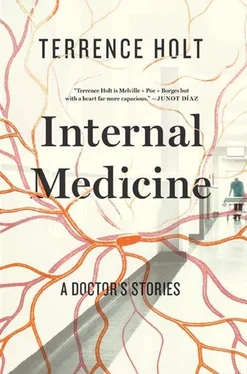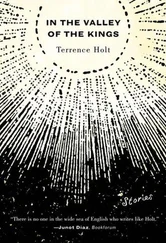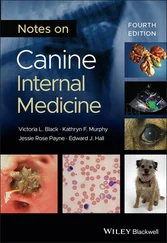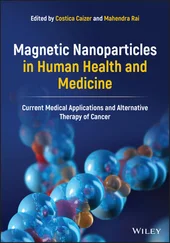“Schott drew himself up, and his accent thickened as if to support him as he almost hissed, ‘For science.’
“ ‘You can’t be serious,’ I said.
“To his credit (and I have to say here that none of us gave Schott credit, not until later, when it was clear we had all underestimated this aspect of his character), Schott knew at once what I meant. He made no attempt to defend himself on the grounds of science from that moment. What he said instead surprised me. It silenced me, too, for the time.
“ ‘Then for hope,’ he said quietly. ‘I give them hope.’
“I think I stood there for a full minute, unable to come up with any response to such a violent hypocrisy, before I turned and left the room.
“To this day I regret that I did not stop and see the boy and his mother, but at the time I knew I was too angry to be of any help there. Instead I stalked over to my own office in the old clinic building, and started making phone calls.
“The NCI was quite happy to confirm that Dr. Schott was indeed named as one of twenty-eight investigators on grant number such and such, for which the principal investigator was a Dr. So-and-So at the Johns Hopkins University. I called Hopkins, thinking I could kill several birds with one stone there, because that had been Schott’s last port of call before he washed up here. But Hopkins was as closemouthed as Bethesda had been chatty. Dr. So-and-So was in Australia and there was no one in Baltimore authorized to comment in his absence on anything related to his research. For a while I couldn’t even find anyone who would admit that Schott had completed his fellowship there. This had me going for a while, imagining that I might trip him up on something as simple as a set of false credentials. But to my disappointment I was ultimately referred to a closemouthed secretary in the heme-onc division. She could confirm that Dr. Schott had completed a fellowship there two years previously. As to anything beyond that, I might have been inquiring of a marble sepulcher.
“As I looked over the sheet of notes I had scribbled while learning so very little, it occurred to me that I might already know all I needed to get Schott bounced out of the state. He had said the project involved leukemia. Ewing’s, even though it arises from an anatomically related structure, has nothing to do with the leukemias: in dragging poor Robert into his laboratory, Schott was treating something he had no license to treat, even under the lax provisions governing cancer chemotherapy then as now. In signing on to a specific research protocol, he had tied his own hands. And now, I hoped, I could use the same rope to hang him.
“I had no idea how to go about this. All I knew was that I had to get Schott out of this hospital before he killed somebody else. Because I had also learned in the course of my inquiries that in the six months since our encounter in the parking lot Schott had been involved in six more cases in which the patients, ranging in age from thirty-four months to fifteen years, had died, either from the diseases he was putatively treating, or the chemicals used in his experiments. That brought the total since his arrival to (at least) fourteen.
“The mortuary tally grew by a pathetic one the following week, when Robert, under the influence of what Schott had described to the father as ‘one more cocktail,’ had vomited without interruption for seventy-two hours through massive doses of prochlorperazine and phenobarbital, until a Boerhaave lesion ruptured his esophagus. It took him several hours after that to die. Two of the nurses on the case had gone on medical leave.
“When I heard this news I actually saw red. I’ve never experienced the sensation before or since, and at this distance it’s a little astonishing to me, but it’s true. As I hung up the phone my field of vision vanished in a scarlet haze. It was as if my eyes had filled with blood. Before my vision had cleared I set out in search of Schott, even though I knew it was a bad idea.
“I found him in his office on the second floor. The door hit the wall as I came through with a bang that startled me, and cracked the frosted glass. That crack was still there several years later, although by then there was a different name painted on the glass.
“He looked up, far less surprised to find me there than I was. Now what? I remember asking myself, but by then my capacity for rational reflection was severely impaired. I was seriously worried that I was going to commit an assault, which would get me into much hotter water than I had planned for him. That restrained me, enough at least to restrict my activities to waving my arms in the air.
“I accused him of a variety of things. Murder. Fraud. Violation of the Hippocratic oath got in there somewhere, and it was a measure of how serious things had gotten that neither one of us found it funny. But no matter what I flung at him, he seemed untouched by it. Not that he looked pleased with himself. He looked miserable, in fact, but not because of anything I had said. He had been that way when I arrived.
“My inability to touch him with any of my own outrage made me even wilder, so wild that eventually I couldn’t say anything. I could only stand there, vibrating with suppressed violence, frustrated by my inability to change the self-pitying expression in those watery eyes.
“At last I dredged up the only thing I could think of that might get underneath whatever he was excoriating himself with: ‘Have you ever helped anybody ?’ I screamed at him. I thought then, and still do, that the worst assessment a doctor could make at the end of his life would be that he had never helped anybody. I wanted to give him that at least.
“By luck, or through some instinctive understanding, I had found a lever. It left his face working visibly as whatever worm I had wakened twisted within him.
“He looked at me, recoiling as though I had offered to strike him, and lifted up a wavering hand to ward the blow. And he said again what he had said in the parking lot half a year before, only this time his tone wasn’t wistful. It was beseeching. He said in a half whisper, and clearly not addressed to me, “There was one.” And then his face fell apart and for a moment I mistook the expression for imminent tears, and recoiled in disgust. But it wasn’t tears.
“ ‘Tortured’ was what it was. I had never seen it before, for all the agony I had witnessed in my brief career, but I knew it when I saw it. And as that word occurred to me something else flashed through the haze still dimming my vision, cracking it into an appalling clarity. I knew what I was looking at.
“ ‘My God,’ I remember saying. ‘It’s the Grand Inquisitor.’ All of a sudden I was thinking about Dostoyevsky. I’d never been able to make head or tail of that part of the book, but the question that introduces it had always stuck in my mind. It goes something like this: If you could usher in the Millenium — end all human suffering, forever and ever — if you could do that, but only by torturing to death a human infant, would you do it? Could you do it?
“I didn’t understand, when I read it the first time, if there was any point to the question: it just seemed another of Dostoyevsky’s grotesque Christian paradoxes. But that was before I met Schott, before I came face-to-face with someone who had also heard the question — and answered it.
“He actually rose to his feet when I said this: rose, and staggered back into the wall. I knew he understood exactly what I meant, and that he understood it because he had already had the same thought. He had made a bargain with the devil. And now had come the only thing that could make that bargain worse: he had been caught with the contract in his grasp, the ink still fresh, steaming where it stained his hands with a child’s indelible blood.
Читать дальше












